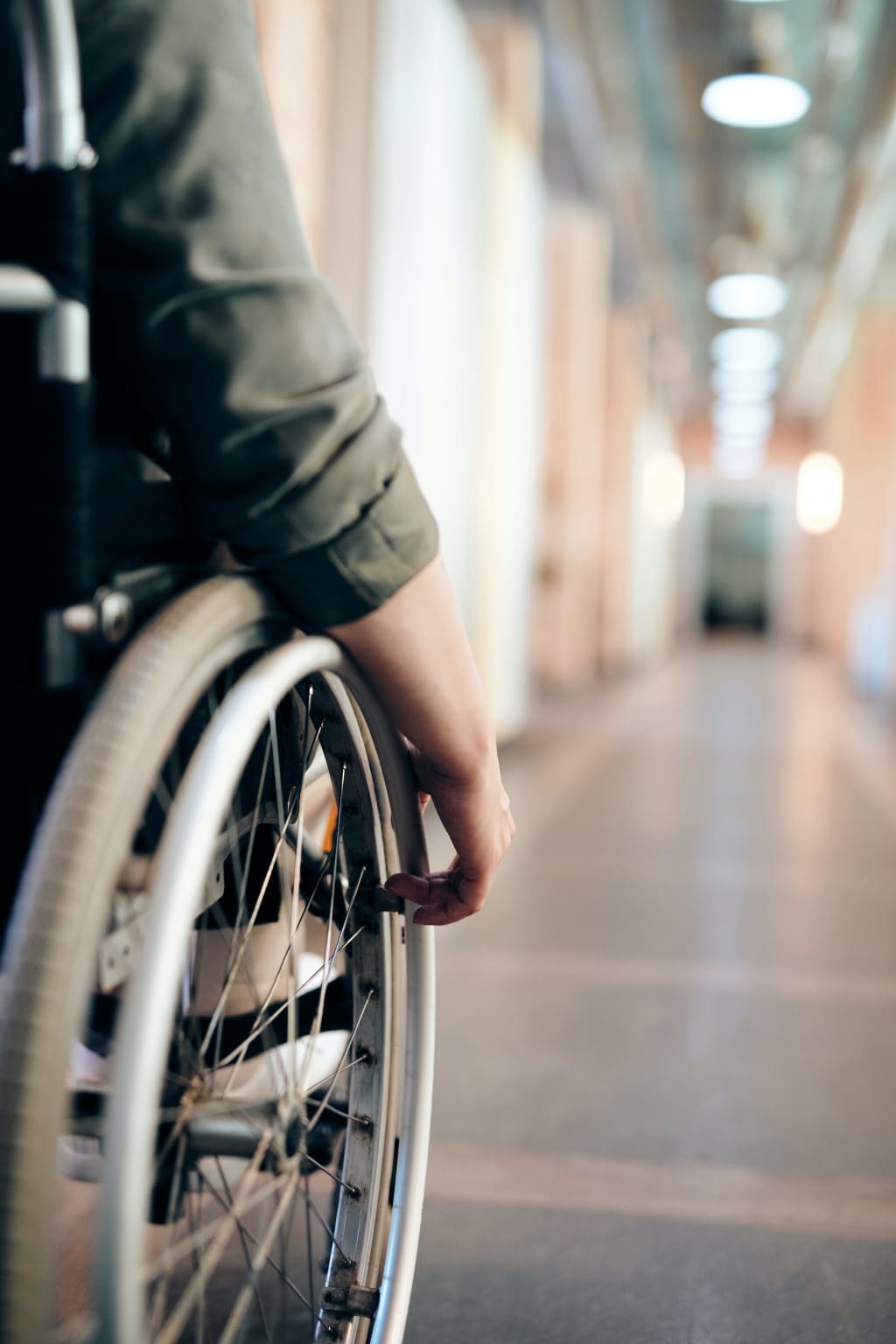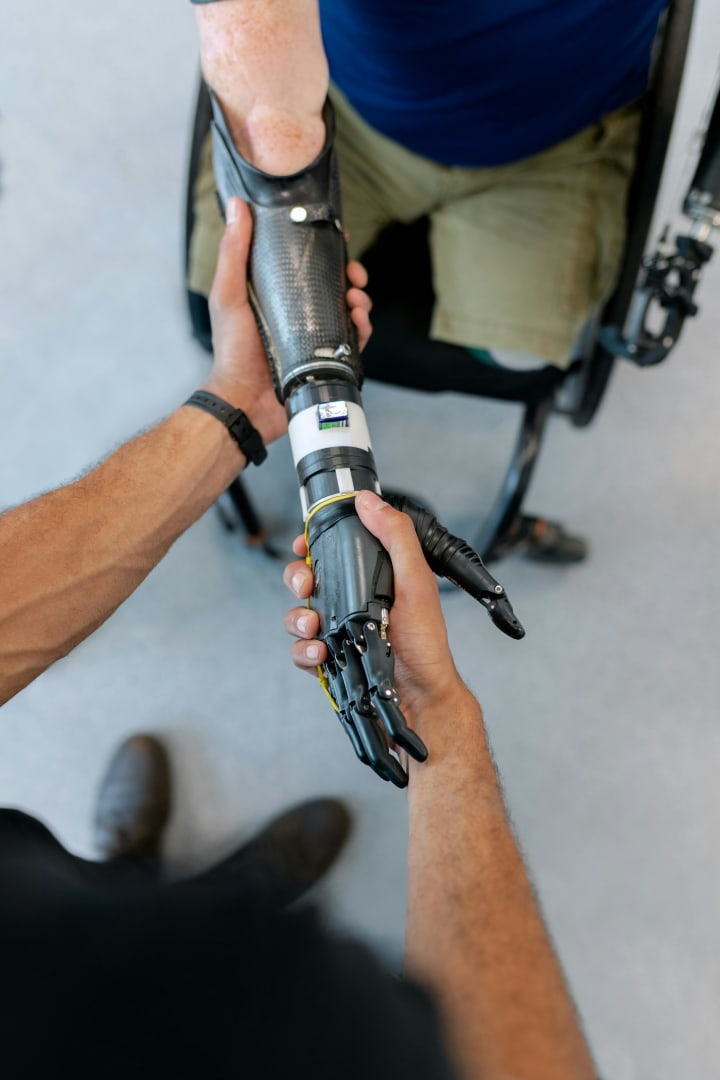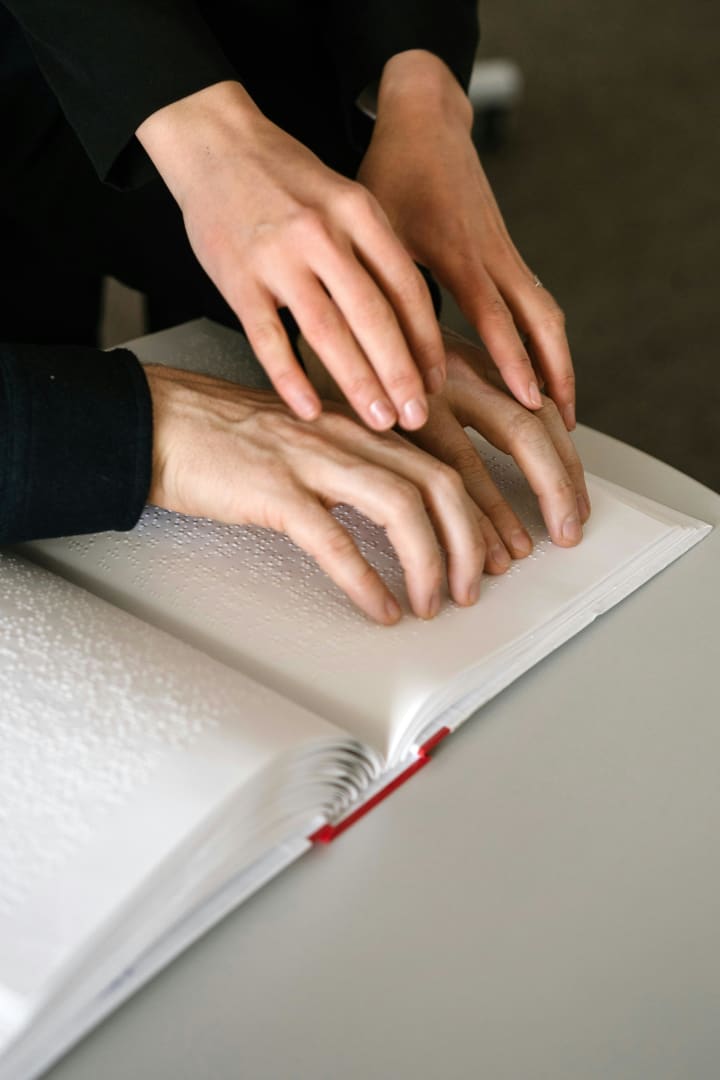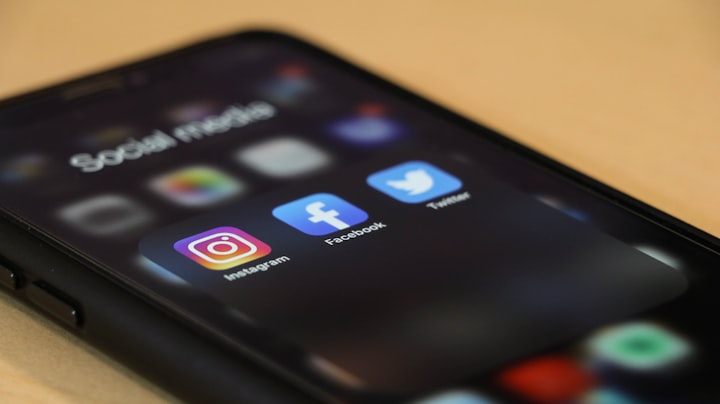Ableist Language You Need To Stop Using
And What To Use Instead

ThWhat is ableism, and why is it harmful?
The disabled community is the world's largest minority. It's also the only minority that anyone could become part of at any time. Many non-disabled people take their health for granted. When you're used to living without worry, it's often easy to ignore the thought of how common disability actually is. According to the World Health Organization, nearly one and a half billion people worldwide live with some type of disability, and it isn't always visible.
Ableism describes any prejudice, bias, and discrimination directed toward people living with disabilities. Disability can include any physical or mental health condition or symptom that significantly affects at least one major activity of daily life. Although many people imagine disability to be evident, it often isn't like this. In America, specifically, over forty two million people live with a disability. Of these forty two million, ninety four percent have invisible disabilities.
An invisible disability is a disability which is not outwardly obvious to others - and due to the assumption that disability must be evident, those with invisible disabilities are often the target of harassment, stigma, misunderstanding, and a demand to prove themselves. Hidden disabilities include mental or chronic illness, learning disorders, brain or spinal injuries, digestive or autoimmune disorders, and sleep disorders.
There are many myths and misconceptions about people with disabilities. Here are some of them.
01. Everybody who uses a wheelchair is paralyzed and cannot ever get out.
An ambulatory wheelchair user is a person who uses a wheelchair to get around, but is also able to walk shorter distances with the help of other mobility devices, such as canes or walkers. Many wheelchair users are paralyzed; however, there are many degrees of paralysis, and two people with the same level of paralysis can still be very different.
02. All Deaf or Hard of Hearing people know sign language and can lip-read.
Like many other disabilities, Deafness exists on a scale. Some Deaf people are able to hear enough that they don't consider a need for sign language. Some may lip-read, but it's never okay to assume a person can sign or read lips just because they are Deaf.
03. Children shouldn't ask about disability.
Often, parents in public scold their children for a natural curiosity. Children are not born prejudiced, and certainly don't understand ableism unless it is taught to them. It's important to understand from a young age that people are all unique, and that being disabled or looking different is not something to be ashamed of. With that being said, there's a difference between asking questions to educate and learn, and asking questions to be rude or intrusive. It's the responsibility of an adult to teach children the difference.
04. Disabled people should only date other disabled people.
I've come across a lot of people who believe interabled relationships are something to be judged. This belief stems from the assumption that people with disabilities are inferior to those without, and that's just not true. People are more than their disabilities, and have many things to offer despite their limitations.
05. People with disabilities always need assistance.
Everyone needs assistance sometimes. Regardless of disability status, there will always be times when we need to ask for help. Many people with disabilities live independent lives by learning to adapt to survive in a society that wasn't made for them. It's never appropriate to attempt to assist a disabled person if they haven't asked for help. It's okay to ask if help is needed, but it shouldn't ever be forced, and the word no should be respected.

Causes of Ableism/Intent Vs Impact.
Misunderstandings are part of life. Because of our own personal biases, experiences, and perspectives, our actions are driven by different things. We can use intent to explain our actions, but we cannot assume that the impact behind our words will be perceived in the way we intended. It's important to remember that while the intention behind our words may be well, someone else may interpret what we say as harmful.
Sometimes, a non-disabled person may come across as ableist without meaning to - so it's essential to listen to the perspectives and opinions of disabled people to ensure the things we say are not hurtful or discriminatory. There are many factors that may contribute to ableism: such as fear of disability, lack of awareness or knowledge, learned social behaviours, religious beliefs, and uncertainty about how to behave.
When it comes to disability, it's very important to acknowledge personal preference. One person may prefer to refer to themselves with person-first language (ie. person with a disability). Someone else may prefer identify-first language (ie. disabled person). To avoid unintentionally harming or stigmatizing someone, always take the time to ask which type of language is preferred.
What are some examples of ableist language? What language can we use instead?
1. Autistic (toward a non-autistic)
Example: Someone says something most would consider "stupid" or "odd". By way of insult, you ask, "Are you autistic or something?"
Why It's Ableist: Using autism as an insult excludes those with autism from the rest of society. When used in this context, it implies that all people with autism are the same: that they should be expected to be unintelligent or odd, and it separates autistic people from the rest of saying by presuming that it's shameful or bad to be different.
What to Say Instead: You can just respond normally. There's no reason to insult someone for expressing themselves in a different way than others, or for having less knowledge about a subject than others might.
2. Bipolar (as an adjective for something fickle)
Example: You've changed your mind several times in a short period. You joke to your friend, saying, "I can't make up my mind! I'm so bipolar!"
Why It's Ableist: Using a mental health condition as an adjective trivializes and stigmatizes mental health conditions. It pokes fun at mental health conditions and dismisses the lived experience of individuals with these conditions.
What To Say Instead: You're indecisive. Or questioning. Or conflicted.
3. Blind
Example: You've spent time looking for an item you lost, and later discover it was in front of you the whole time. Frustrated, you grumble, "How did I miss something that was right in front of me? I'm so blind!"
Why It's Ableist: It's very common in the English language to use phrases containing the word 'blind' figuratively or metaphorically. To most, these phrases are so familiar that they're innocent - but by using blind in this way, we suggest that those with visual impairments are oblivious or ignorant, and that blindness is something to be ashamed of.
What To Say Instead: Blind is a word I, and many others, have used metaphorically many times. When something becomes a habit, we often fail to think about the implications behind our words or actions. In this case, there's really no need to reference blindness at all. Instead of saying, "I'm so blind!" or something of the like, we can say, "I must not have looked very well," or "I finally found what I was looking for! It was right in front of me."
4. Crazy
Example: Your friend is telling you about an eventful day they had at work. To express your understanding of your friend's stressful experience, you say, "Wow, that's crazy!"
Why It's Ableist: The word crazy has a long history with mental illness. It stigmatizes and illnesses those who live with mental illness by suggesting that they act outlandishly. By referring to a situation as "crazy", we build upon the stereotype that people living with mental illness are challenging and overwhelming, and we dismiss the struggles that mental illness brings to the people it affects.
What To Say Instead: Outrageous, wild, strange, absurd, ridiculous, or unnatural.
*Note: This also goes for words like nuts, psycho, bonkers, loony, cuckoo, and insane.
5. Cringe
Example: Cringe culture defines a subgroup of people who mock and spotlight the "atypical" behaviour of others. It exists massively among the neurodivergent community online, especially when it comes to autistic people. I believe there's a large amount of internalized ableism among neurodivergent people who struggle to be true to themselves in society, and who envy others who seem to struggle less.
Why It's Ableist: Pointing out the quirks or standard neurodivergent behaviours of others is ableist because it others those in society who don't quite fit in, and it suggests that a behaviour that is defined as unusual or eccentric by society is something to be made fun of.
What To Say Instead: Nothing. Just let people live their lives.
6. Dumb/Stupid
Example: Your colleague makes a mistake that you think is a foolish mistake. You acknowledge this mistake by saying, "You're so dumb. I wouldn't have done something so stupid."
Why It's Ableist: These words go back hundreds of years in history, and always existed as a way to demean those that were deemed unintelligent or belligerent. In the 20th century, thousands of people were forcibly sterilized in America due to their presumed intellectual disability. By using the words stupid or dumb as an insult, we reaffirm historical biases that state the "unworthiness" of people with intellectual disabilities.
What To Say Instead: Dull, foolish, silly, outlandish, ignorant, or ill-informed.
07. Freak/Freaky
Example: There's a student in your class who keeps to herself, and has quirks you find strange, such as talking to herself and eating lunch alone. Another student follows her in the hallway, shouting at her retreating figure, "You're a freak!"
Why It's Ableist: In the ninteenth century, citizens with physical disabilities were often exploited by institutions and the general population by being placed in "freak shows" to be ogled and observed. This word implies that those who do not look "normal" are inferior, and therefore do not deserve to feel at home in society. Although the word freak is often used to refer to people with physical disabilities, it can also be used as an insult toward neurodivergent people who do not conform to behaviours that society deems typical.
What To Say Instead: There's really no need to comment on the appearances or behaviours of others, especially if they are already ostracized because of it.
08. Handicapped
Example: A disabled man attends a college course you're a part of. Other classmates and professors refer to him as "handicapped".
Why It's Ableist: The word handicap originated in sports, and refers to an obstacle given to a stronger player in order to weaken their performance, which in turn puts them on more equal footing with their competitor. It became associated with disability due to its connotation with "disadvantage"; the word handicapped meant to have a physical disadvantage compared to those without disabilities.
What To Say Instead: Disabled, or person with a disability - depending on personal preferences.
09. Lame
Example: You attend an uneventful party with a group of friends. Due to the humdrum of the evening and a less interesting night than you hoped, you talk among yourselves after leaving about how lame the party was.
Why It's Ableist: Historically, lame referred to people with physical disabilities or impaired mobility. By describing an event or situation as lame, we express negativity or disappointment. In doing so, we equate physical disability with dullness or negativity.
What To Say Instead: Uncool, uneventful, awful, boring, unpleasant, or uninteresting
10. Low-functioning/high-functioning (in regards to autism)
Example: You learn that a colleague of yours is autistic, but he doesn't seem it. You assume he must be high-functioning, since he can hold down a job and make friends like a normal person.
Why It's Ableist: Many autistic people dislike functioning labels. Because autism is not linear, it can manifest in more ways than just more autistic and less autistic. By telling someone with autism that they seem "high-functioning", we are implying that their ability to fit in with non-autistic people makes them seem more "normal" - and this implication is hurtful because it dismisses the struggles that autistic people face every day in order to appear "normal". Likewise, when we say that someone with autism is "low-functioning", it implies that they are incapable, and as a result, those assigned this label are often isolated and ostracized.
What To Say Instead: You can refer to a person with autism without using labels at all. An autistic person who communicates verbally and is able to socialize is not less autistic or more capable than a person who uses communication devices and keeps to themselves.
11. Midget
Example: You're walking with your child in a public place. After noticing a little person, your child points, shouting loudly in the midst of a crowd, "Look, a midget!"
Why It's Ableist: In the mid eighteen hundreds, an American showman named P.T Barnum opened a circus where he featured little people in exhibits, known as midgets - derived from the word 'midge, or: a small fly'. In the late eighteen hundreds, the word became a reference to little people who were publicly exhibited as a curiosity to the public. Although the word midget, at one point, was in common use among medical professionals and even little people themselves, it is extremely derogatory in today's society. By using this word to refer to someone, we imply that they are only known as a "sideshow", or a spectacle to be judged and ogled at.
What To Say Instead: Little person, or person with dwarfism, depending on personal preferences.
12. OCD (as a person without OCD)
Example: Here's something my mother does all the time. After insisting something be organized or cleaned, she'll smile sheepishly and say, "Sorry, I'm just so OCD about that."
Why It's Ableist: By using mental health conditions as adjectives in this way, we dismiss the experiences of people who live with these conditions - thereby reducing their illness to a quirk. OCD is a debilitating mental health condition that can take a serious toll on a person's life, not a casual way to explain one's preference for tidiness and order.
What To Say Instead: You can say you're detail-oriented, or you like to be organized.
*Note: It's important to differentiate here the distinction between OCD and OCPD - two separate conditions that are often used interchangeably. Obsessive compulsive disorder is an anxiety disorder characterized by obsession and intrusive thoughts that cause repetition in behaviour and actions. Obessive compulsive personality disorder is a condition characterized by excessive focus on order and perfection.
13. Retard/Retarded
Example: No example is needed for this. You all know what I'm talking about.
Why It's Ableist: Why anyone is still using this word in 2024 is beyond me. Terms like retard are used to reference a person's cognitive disability, so using it as a way to insult someone or speak negatively about a situation is highly offensive and derogatory toward those with intellectual disabilities.
What To Say Instead: Annoying, obnoxious, irritating, frustrating, unbelievable, or ridiculous.
14. Spazz/spastic
Example: Your sibling responds more dramatically to family news than you feel is necessary. You respond by rolling your eyes and saying, "Why are you such a spaz? It's not a big deal."
Why It's Ableist: Up to and previous to the mid nineteenth century, spastic was used mostly only in the medical sphere to describe individuals living with degrees of muscle spasticity. In or around the 1950's the word spastic was shortened to spaz, and became a negative way to refer to someone who is clumsy, unintelligent, or unpredictable in their behaviour.
What To Say Instead: Klutz, clumsy, inept, awkward, fumbler, going berserk, flipping out, or losing control.
15. Special Needs
Example: This term is used very commonly in education and community settings. A teacher may refer to one of his disabled students as "special needs". A caregiver for the disabled may refer to someone under her care as "special needs".
Why It's Ableist: The term "special needs" is used as an euphemism for the word "disabled". It suggests that referring to someone as having a disability might make non-disabled people uncomfortable, so the need to use a "softer" word is warranted. Saying someone with disabilities has special needs is stigmatizing because every human being has needs, and the implication that some needs are special and some are regular is offensive and ableist.
What To Say Instead: Disabled, or person with a disability
What kinds of things shouldn't you say to people with disabilities?
1. "You're such an inspiration!" or "You're so brave!"
People with disabilities do not exist to inspire those without. Telling someone they are brave or inspirational may come across as patronizing due to its assumption that living with disability requires courage. We are all just doing our best to survive the lives we were given.
2. "You don't look disabled."
This is an immensely invalidating thing to say. It reaffirms the stereotype that all disabilities are physical, and further ostracizes those with hidden or invisible illnesses.
3. Any unsolicited medical advice
If your advice was wanted, it would be asked for.
4. "It's God's will!" or any variation
It's rather presumptuous to assume that everyone shares the same religious beliefs, and this can be dismissive to people with disabilities.
5. "Why do you have a wheelchair if you can walk?"
Again, not all disabilities are visible. You wouldn't question a non-disabled person about their medical background. It's ableist to question a disabled person about their disability status or medical history just because they are disabled.
6. "You're just faking. I know [someone else] with this disorder and they're not like that."
This is ableist because it defines the experience of someone based on the experience of someone else, and it invalidates lived experience by assuming disability will affect everybody in exactly the same ways.
7. "What's wrong with you?" or "What happened to make you like that?"
It's not really appropriate to ask people about their personal lives when you weren't told, especially if it's someone you don't know. Other people's medical histories are none of your business, and it's incredibly intrusive and rude to demand to be told.
8. "You're too pretty/young/healthy/active to have a disability!"
Disability doesn't discriminate. I could become disabled tomorrow. You could become disabled tomorrow. That's all I have to say about this.
9. "Let me help you with that..."
If you aren't explictly asked for help, don't try and offer your help. This is patronizing, unhelpful, and can be embarrassing for someone else. It's okay to ask if someone needs help, regardless of whether they're disabled or not. However, you should never assume that someone needs help just because they may be doing things differently than most people would.
10. "Other people have it worse."
Our trauma and struggles are not a competition. Disability always has its difficulties, regardless of how competent or independent someone seems.

So how can we adjust our language to avoid using ableist terms and phrases in everyday life?
01. Speak to disabled people.
Learn about their experiences and biases, and how casual ableism harms and stigmatizes the disabled community. Ask how individuals with disabilities prefer to be referred to before talking about them.
02. Get support from friends and family.
Social support can encourage us to change our language by holding us accountable when we make mistakes. Likewise, we can hold others accountable for using ableist or derogatory language, and encourage one another to be more mindful of how he communicate.
03. Create a challenge.
Challenge yourself and/or others to go a pre-determined amount of time without using ableist language. Ask others to join you, and see who can go the longest without using ableist language. After this duration of time expires, set a challenge for a longer duration. Eventually, this will create a habit of mindful communication.
04. Keep practising!
Breaking a habit takes time. Most of us have been socially conditioned into using words or phrases with ableist undertones, and it's easy to say things without really considering the implications behind them. When we catch ourselves using ableist language, we can take the time to back-track and replace this language. The important things are to hold ourselves accountable, to be patient with our mistakes, and to put in the effort to change our language to be more inclusive.
___________________________________________
Sources
https://www.autistichoya.com/p/ableist-words-and-terms-to-avoid.html
https://johnduthie.com/2023/09/06/30-inappropriate-comments-to-a-disabled-person/
https://www.aruma.com.au/about-us/blog/10-things-not-to-say-to-someone-with-a-disability/
About the Creator
ghostsandrebels
i'm a a queer writer, poet, cat lover, and author. i'm passionate about psychology, human rights, and creating places where lgbt+ youth and young adults feel safe, represented, and supported.
29 | m.
follow me on threads for more.






Comments (1)
spectacular! this was excellent to see on vocal and in the world more generally. comprehensive, clear, and important! i remember the metaphorical use of "blindness" or "blind spot" has been corrected to "insensitivity." at least that's the last i read about it.